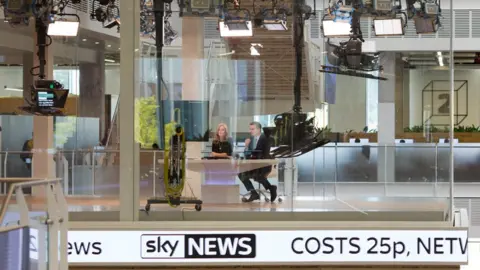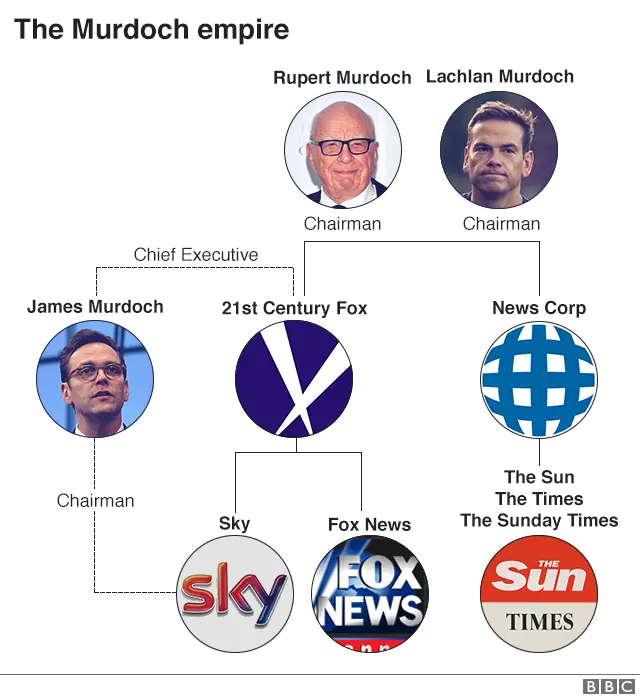Sky-Fox deal not in public interest, says regulator
 Sky
SkyFox's proposed takeover of Sky is not in the public interest on grounds of media plurality, the UK's Competition and Markets Authority (CMA) has said.
The CMA has provisionally found that if the deal went ahead as planned, it would give the Murdoch family too much control over news providers in the UK.
However, the CMA found the deal would not be against the public interest on the grounds of broadcasting standards.
Disney has agreed to buy most of Fox's business, so may end up owning Sky.
Disney's proposed takeover, which still has to be approved by US regulators, includes Fox's current 39% stake in Sky.
And if the Sky-Fox deal does finally go through, the whole of Sky would be likely to transfer to Disney's ownership.
Wide influence
Fox has been trying to buy the 61% of Sky that it does not currently own.
But the CMA decided that if this happened, the Murdoch Family Trust (MFT)'s control across all media platforms in the UK would give it too much influence over public opinion and the political agenda.
However, one of Sky's senior directors was still confident that the regulator's preliminary decision was not the end of the deal.
Sir Martin Gilbert, Sky's senior independent director, told the BBC: "It still seems likely that Sky can offer concessions that will see this deal go through."
BBC Business Editor Simon Jack said some investors might favour one of those options - closing the loss-making Sky News - as it might allow shareholders to ask for a higher price from Disney.
The Murdoch family's news outlets are currently consumed by nearly a third of the UK's population across TV, radio, online and newspapers.
That is significantly greater than all other news providers, except the BBC and ITV.
In a statement, Fox said it was "disappointed" by the findings.
It added: "We will continue to engage with the CMA ahead of the publication of its final report in May.
"We welcome the CMA's provisional finding that the company has a genuine commitment to broadcasting standards and the transaction would not be against the public interest in this respect."
Sky said that it noted the CMA verdicts on both sets of grounds and that it "had set out possible remedies" around plurality "and is seeking submissions on these".


The CMA also concluded that Fox had a "genuine commitment to broadcasting standards in the UK" and was established in the country.
It added that Sky also had a good record with "comprehensive and effective policies and procedures" to ensure the quality of its broadcasts.
The CMA also considered recent allegations of sexual harassment against Fox News employees in the USA, but provisionally found these were not directly related to the attainment of broadcasting standards.

Analysis: Amol Rajan, media editor
Critics of Rupert Murdoch have never been shy to speak out against him, and the CMA has provided them with a killer quote they will be singing for years to come.
In saying that full control of Sky would give the Murdoch Family Trust excessive "influence over public opinion and the political agenda", the regulator has delighted those who argued against an earlier bid by the Murdochs, nearly seven years ago, which was of course derailed by the phone-hacking inquiry.
 Getty Images
Getty ImagesBut this is a curious story, because the CMA findings could prove redundant.
They want remedies, mainly around editorial independence for Sky News, which could be provided quite easily by Disney, who may well own Sky in a few months' time.
Disney's bid for Fox - the parent to Sky - is currently mired in a US regulatory process. If US regulators approve it, many of the concerns the CMA have about this deal will fall away.
So it all comes down to whether Disney is committed to Sky - and specifically Sky News which, though a world-class product, is loss-making.
Ironically, the bigger threat to media plurality may come from Disney deciding Sky News is an expensive distraction to their focus on entertainment.
For now, that seems unlikely: Bob Iger, the boss of Disney, said he was committed to Sky News. Staff there - and all those who care for a diversity of thought in British media - will hope to hear more from Mr Iger soon.

Possible solutions
Disney agreed to buy the majority of 21st Century Fox's business last month, including its 39% stake in Sky.
At the time, the BBC understood that the deal would not alter the CMA investigation into Fox's proposed takeover of Sky.
Disney and Fox hope their deal will be completed by the middle of 2019, after the Sky-Fox deal, although it still has to be approved by US regulators.
The CMA said that as a result of the timings, it could not consider the Disney deal when assessing the Sky-Fox deal, but did suggest that its implications could be considered among possible remedies to the transaction.
The CMA's three remedy approaches to address the plurality concerns are:
- stopping the deal going through
- spinning off or selling off Sky News
- insulating Sky News from the MFT's influence
'Too much power'
Anne Lambert, chairwoman of the CMA's independent investigation group, said: "Media plurality goes to the heart of our democratic process.
"It is very important that no group or individual should have too much control of our news media or too much power to affect the political agenda."
The process now moves to a three-week public consultation where the CMA will receive responses to its provisional ruling, a spokesman told the BBC.
After that, it will incorporate the responses into a final report, which will be sent to new Culture Secretary Matt Hancock by 1 May.
He then has 30 working days to make the final decision as to whether or not the deal will go ahead.
